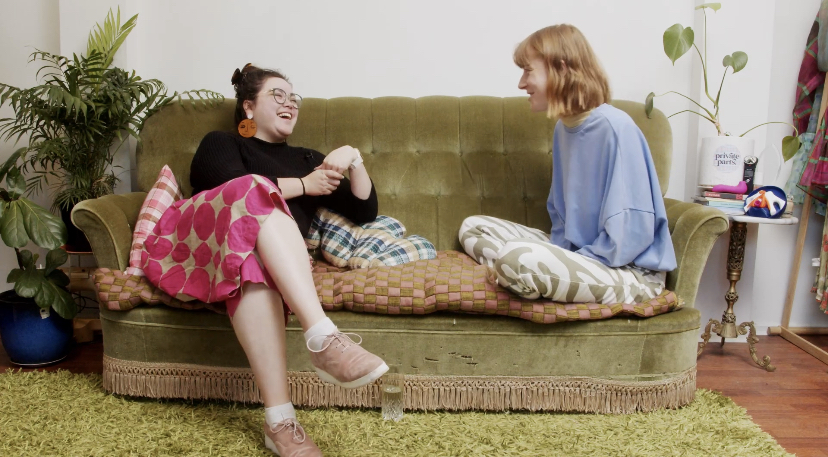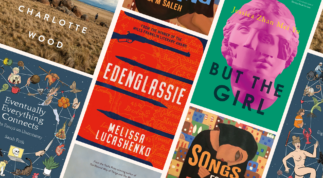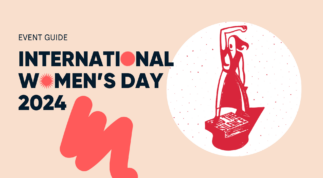Multiple surgeries; IVF; medical gaslighting; and debilitating, isolating pain, Fi Macrae has been through a lot on her endometriosis journey. It’s estimated that one in nine Australian women have the chronic condition, where tissue like the lining of the uterus goes rogue, causing inflammation, scarring and in some cases terrible pain. It takes the average person seven years to be diagnosed with endometriosis, and life with chronic pain can feel lonely. But support is out there, and the best way to find it is by connecting with those who have trod this path before. Of course, everyone’s experience of pain will be different, and there are many possible reasons for pelvic pain and tricky periods, but Fi is here to tell us what helped her, in the hope it helps you too.
Keeping a diary of her symptoms – and not being stoic about them
“You can be stoic in character, and that’s great – but it’s not going to help you in your appointment to be the tough guy. I think we’re so trained to be alright that we can minimise our stuff,” says Fi, remembering her early appointments with GPs, when she was turned away and told that what she was experiencing was normal – even though she spent most days doubled over, vomiting from the pain.
Experience has shown that the more specific Fi can be about her symptoms, the better. She uses a traditional diary, with dates like a calendar, but notes that you could also use a period tracking app. “If there’s any specific points during the day that the pain is particularly bad, I’ll just jot it down… Using words like sharp, or dull, and trying to figure out where exactly the pain in my body is – trying to be as descriptive as possible,” she says. Noting any other factors, such as where you’re at in your cycle, your mood and energy levels, the length of your periods and the amount of blood you’re losing, will all help in the consulting room.
Bringing someone she trusts along to appointments
Fi says that at all stages of her diagnosis and treatment, having someone else in the room with her – a friend, family member or social worker – really helped her to process complex information about her diagnosis and treatment, especially when it wasn’t all good news. “A lot of this stuff, when it’s initially brought up – things like fertility or operations – can make you go quite blank. So to have another set of ears, and someone taking notes for you – being slightly removed from It – can help get all the in-between bits when you freak out a bit.” Another voice in the room can also help paint a picture of your symptoms, reiterate your boundaries, and advocate on your behalf if you need them to.
Seeking mental health support
“You can’t be in long bouts of pain and not have it impact your mental health in every single way,” says Fi, who was seeing a therapist long before her pain started and reckons it has helped her heaps since she got sick. “Because you’re dealing with – for a lot of us – a change in identity. Like, we’re cruising along with ambition and doing all that stuff, and then suddenly, it has to stop. And you’ve got to grieve the things you’ve planned for yourself, you know?”
Grief, fear, anger, confusion, loneliness and a sense of loss are all very reasonable responses to pain and illness, particularly when navigating a medical system with a proven history of misogyny. “I think it’s really important to acknowledge all of the things that are coming out through this process… Anger is a very natural response to this and how do we manage that without it taking over us?”
Doing what she can, when she can – and being open about it
“My main thing is just not to put too much pressure on anything you’re doing in a given day,” says Fi, who wants us to remember to be kind to ourselves and our bodies in all contexts – whether that be socialising, working, or moving our bodies. Fi sets herself simple goals, but is learning to be flexible when her health means sometimes things aren’t possible. “I never want to disappoint myself before the day has even begun, because it’s completely out of my hands,” says Fi, who might swap out a swimming session for a bit of tai chi, or even some stretching in bed, if her body asks for movement but her pain makes it hard.
The same thing goes for socialising, and for work. Fi’s a passionate believer in keeping an open dialogue about what is going on for her – indeed, the reason Private Parts began was because Fi wanted to share about her illness and treatment with her friends but didn’t have the capacity to reach out to people individually. She thinks that if you feel safe and comfortable to share your experience, everyone in the chronic pain and disability space benefits from it, and she is heartened to see that many newcomers to Private Parts have joined the group to educate themselves about their friend’s or loved one’s medical condition – something that she believes can only lead to a more inclusive and supportive culture. Workplaces are catching on, too, offering flexible arrangements and, increasingly, menstrual and menopausal leave (shoutout to VWT!).
Going online and finding her people
If there’s one thing that you take with you from reading this post, please let it be that you are not alone. “You won’t find people in the same situation in real life because we’re not at the pub – we’re at home in our beds! – and I think that’s where the online world really shines to me,” says Fi, who discovered a thriving community when she got sick, and reckons support, compassion and some excellent tips and tricks for treatment are usually just a DM away. These days, her online mates are some of her best, despite the fact she’s never met them in real life. “No matter what you are going through, there’s someone out there who is going through the same thing.”
For more information, resources and support, visit Endometriosis Australia.
 Mel Fulton is a writer, editor and broadcaster who has endometriosis. She is the Books Editor at The Big Issue Australia and the host of Literati Glitterati on Triple R.
Mel Fulton is a writer, editor and broadcaster who has endometriosis. She is the Books Editor at The Big Issue Australia and the host of Literati Glitterati on Triple R.



